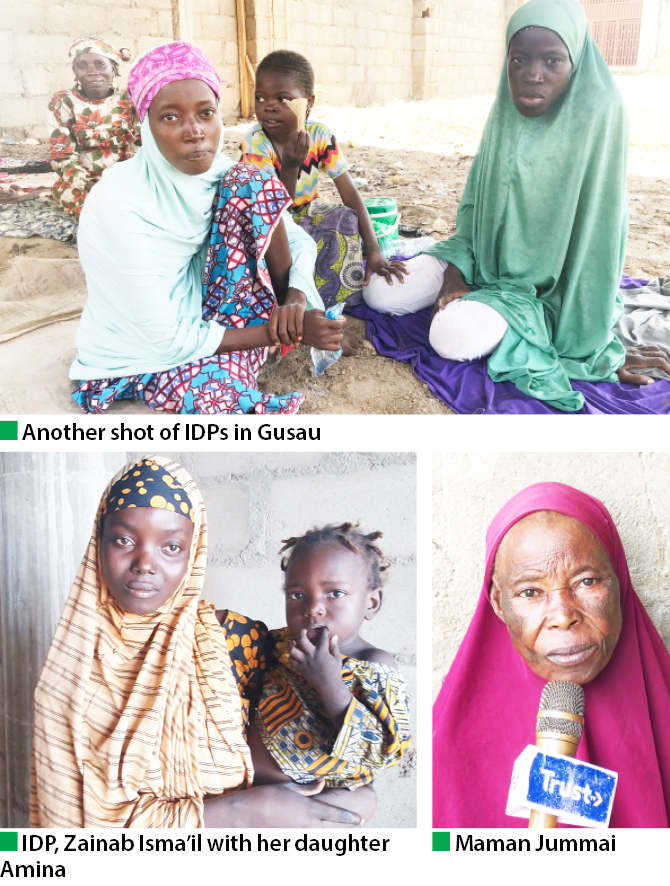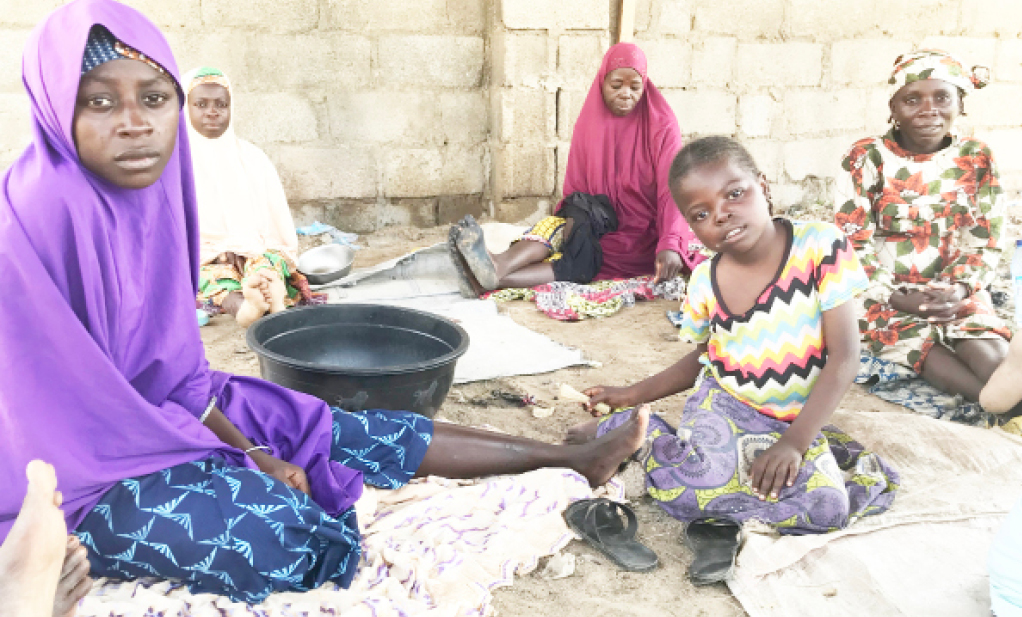Thousands of Internally Displaced Persons (IDPs) in Zamfara State have been suffering in silence years after they were sacked from their respective villages and towns by armed bandits, Daily Trust on Sunday reports.
Most of these citizens, who relocated to Gusau, the state capital, are currently taking shelter in some uncompleted public buildings, motor parks and markets within the metropolis.
Majority of them have lost their loved ones, with their houses burnt and animals rustled by the dreaded bandits who have been terrorizing communities across the 14 local government areas of the state. These residents, Daily Trust on Sunday gathered were left with no option than to abandon their homes and relocate to safer places.
Our correspondent observed that the women and children among the displaced persons have turned to beggers and scavengers, roaming the streets of Gusau in search of what to eat. Their daily schedule usually starts as early as 6am and ends at midnight.
Tinubu to Saudi investors: All bottlenecks will be crushed
Obaseki remains my friend despite political differences – Oshiomhole
Also, the abled bodied men among them, who were hitherto feeding the society through farming and animal rearing, are now relying on begging and menial jobs to feed their families taking shelter in some public places in the state metropolis and environs.
These displaced persons relocated to the state capital from various villages and towns that were worst hit by banditry such as Maru, Kaura-Namoda, Anka, Tsafe, Gumi, Zurmi, Bungudu and Shinkafi.
Little Zainab is one of the displaced children whose ambition of acquiring western education has ended in begging. Zainab told Daily Trust on Sunday that “I had wanted to continue schooling, but my parents relocated to Gusau because of banditry, and now my ambition is dashed.
“I was schooling in my village but since we came to Gusau, I no longer go to school. I only go about begging for what to eat. I go out every day to beg. For now, I do not attend school, not even Islamiyyah.”
Majority of the displaced persons had lost everything to the bandits before relocating to Gusau to start a new life. Very few among them were able to establish small businesses in Gusau, but the rest are surviving on either begging or scavenging.
Also, some of the displaced women, whose husbands and children were killed by the bandits, have now become the breadwinners of their respective families. This category of women, who rely solely on begging for daily meals, always wake up as early as 6am and start moving from one public places to another seeking for arms.
Daily Trust on Sunday learnt that among these women are some who have spent almost two years without knowing the whereabouts of their husbands.
According to one of them, Maman Jummai, “I am a married woman but I don’t know where my husband is right now. Since the bandits dispersed us from our village about two years ago, we have not seen each other.
“He doesn’t know where I am and I do not know where he is right now. I am lucky; I escaped the bandits with my daughter. I am still together with her here in Gusau. But for my husband and 3 of my children, sincerely speaking I don’t know where they are or their condition; whether they are still alive or dead, I do not know.”
Another displaced woman, Malama Sadiya Musa, was seen lying under a shed suffering from fever and stomach ache along Sabuwar Kasuwa area in Gusau. Narrating her ordeal to our correspondent, she said: “My stomach has been paining me a lot and most of the time I feel dizzy. It’s been four days now. We are victims of banditry; we left our village for the past three months. We’re from Isa in Sokoto State.
“The bandits ransacked our village and killed our parents and husbands. We cannot go back. That is why we left and are trying to start a new life here by the roadside in Gusau.
“We normally go about begging during the day and at night, we find a place to sleep in front of the shops. Most of our husbands are dead while others don’t know where their husbands are.
“My husband was killed and I was left with four children. Two were later killed and I’m left with the remaining two. They are currently out begging. When they beg and get something, we eat but if they don’t get anything, we sleep on an empty stomach.
Malama Habiba Lawali is another victim, whose husband was killed by the bandits in her presence. The widow said: “Bandits killed my husband with a gun in my presence and left my children fatherless. I was about to go out, when they said I should wait. They cut off his head and kept it on his chest.
“They later came back and chased us like animals; I managed to escape and disappeared through the bush. Two of my children are still with them for a year and seven months now.
“Currently, I am with five of my children. We eat grass and other leaves we get from the bush whenever we don’t realize anything from begging. We now beg for a living.”
There is no official camp for the Internally Displaced Persons in the state, and so the IDPs have spent years squating in various public places which they have turned to their homes. A lot of them sleep in uncompleted public buildings like the famous Investment House, motor parks and market, while those who can afford it, rented houses for their families.
While some of the displaced persons have spent up to five years in the state capital since their relocation from their respective towns and villages, others came to the city recently after the bandits sacked their villages in some recent attacks.
The luckiest among the displaced women are those who relocated to the state capital alongside their husbands and children. Although they are also staying in either uncompleted buildings or rented houses, they do not go out to beg because their husbands and children are catering for them.
The people of Gusau have been very helpful to the displaced persons, as they always assist them with free accommodation, clothes, foodstuff and even money despite the economic situation of the country.
This single gesture, Daily Trust on Sunday observed, has brought a lot of relief to the displaced persons, especially during the rainy season.
Although majority of the displaced persons are indigenes of Zamfara, the state government is being accused of making little or no efforts in improving the wellbeing of these IDPs.
But speaking to Daily Trust on Sunday, Honourable Amiru Ahmad Keita, member representing Tsafe West constituency and chairman, House Committee on Information, said Dr Dauda Lawal-led administration has taken a bold step towards addressing the menace of banditry in the state.
Keita said the state governor had presented to the state House of Assembly the two executive bills; Community Protection Guards and Security Trust Fund in his efforts to address banditry in the state.
“While the Community Protection Guard bill is meant to promulgate law that will pave way for legalizing establishment of local guards in the state to protect the lives and properties of the citizens, the Security Trust Fund bill is to mobilise money to fight banditry.
“I want the federal government to consider the needs of Zamfara State. The security personnel on ground are doing their best, but in the course of doing their job, they need government’s support and re-enforcement. The federal government should consider Zamfara State as it did to other states like Borno. Mr President has promised Zamfara State of intervention. We urgently need Federal Government’s intervention to address the menace of banditry in the state,” he concluded.
Further observations revealed that beside none provision of official camps for the IDPs, the assistance claimed to have been offered to the IDPs by the state government is grossly inadequate to alleviate their sufferings as majority of them are still roaming the streets in search of food and shelter.
Unless government and concerned stakeholders pay attention to the plights of the displaced persons, this people would continue to suffer in silence in their state of origin.

 Join Daily Trust WhatsApp Community For Quick Access To News and Happenings Around You.
Join Daily Trust WhatsApp Community For Quick Access To News and Happenings Around You.


